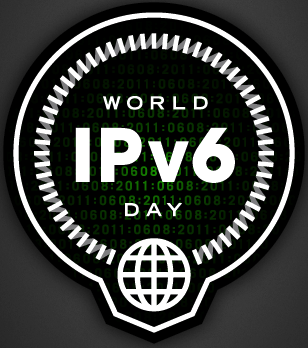Tomorrow is World IPv6 Day. Many Internet giants including Google, Facebook and over 400 companies joining the Internet Society for the event.
What is IPv6?
In February, the last IP addresses was sold. The numerical format of the IP addresses and their restrictions limited the number to 4.3 billion. While once deemed more than sufficient, Internet ubiquity and a growing need for Internet connectivity of portable devices, appliances, schools and households have created the need for a new system that mathematically can provide more addresses. This system is called IPv6 (IPv5 was already tried – and failed – in the late 1970s).
IPs power the Internet. You might type www.google.com into a browser. But under the hood, your browser is talking to your ISP asking what the address for this www.google.comthing is. In a manner similar to a phone book, your ISP users servers that translate www.google.cominto a numerical address, because that’s all the computer knows for navigation.
What is World IPv6 Day?
IPv6 Day is the day Internet service providers have chosen to test the readiness of the world for IPv6, the new style of Internet Protocol (IP) addresses. The format has changed dramatically. You may have already seen an address that looks similar to:
10.20.30.40
Now those addresses will be a mixed notation of hexadecimal digits(numbers and letters) separated by colons instead of dots, like this:
2001:0db8:85a3:0000:0000:8a2e:0370:7334
Clearly this is a major change. One that requires a wide-scale test for Web sites, mail servers, ISPs, mobile Internet and broadband companies and anyone who makes their living routing data around the Internet. Wednesday, June 8, 2011 is the day people will be testing by using only IPv6 addresses from 0000 to 2359 UTC. For non techies and the time-zone challenged, this is a 24 hour period starting at Midnight, Greenwich Mean Time (GMT).
Is the Internet Going to Break?
Not exactly.
Many of the major companies involved in the test have been testing their IPv6 readiness for years. Most newer versions of operating systems have had IPv6 support, too. While the necessity to change over is new, the planning, concepts and implementation really isn’t. Google has been supporting IPv6 since 2008. Their research shows that 99.95% of their users will be unaffected by the test.
You can test your Internet service provider’s readiness to route you to sites that are IPv6-enabled with the Web-based IPv6 readiness test. If your ISP does not support IPv6, you will notice slowness and possibly some unresponsiveness as your connection attempts to failover to IPv4 routing for the 24-hour testing window.

Is your company planning on being part of the test? Share your IPv6 day experiences with us in the comments below!
